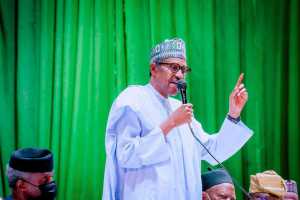
President Muhammadu Buhari has assured investors that his government is doing what is necessary to make Nigeria a viable investment destination for them.
Buhari stated that one of the ways his government has done this, is by making the Transmission Company of Nigeria (TCN) financially viable to provide more electricity for the country and for investors.
The president, represented by Ibrahim Gambari, his chief of staff on Thursday, stated that Nigeria needs N298.3 trillion from private sector players to achieve the objectives set out in the National development plan.
“As you may be aware, Nigeria’s National Development Plan (2021 – 2025) was formulated against the backdrop of several subsisting development challenges in the country and the need to tackle them within the framework of medium and long-term plans,” he said.
Also Read: Atiku’s Economic Blueprint Poor Copy Of Buhari’s Model – Lai Mohammed
“This all-encompassing plan, aims to generate 21 million full-time jobs and lift 35 million people out of poverty by 2025, thus setting the stage for achieving the government’s commitment of lifting 100 million Nigerians out of poverty in 10 years.
“To attain the objectives of the National Development Plan (2021 – 2025), we estimate that we would require an investment commitment of about N348 trillion.
“Government capital expenditure during the period will be N49.7 trillion (14.3 percent) while the balance of N298.3 trillion (85.7 percent) is expected from the Private Sector. Of the 14.3 percent government contribution, FGN capital expenditure will be N29.6 trillion (8.5 percent) while the Sub-National Governments’ capital expenditure is estimated to be about N20.1 trillion (5.8 percent).
“The successful implementation of this Plan will therefore, be heavily dependent on strong partnerships between the private and public sector, both within and with Development Partners outside Nigeria.”




